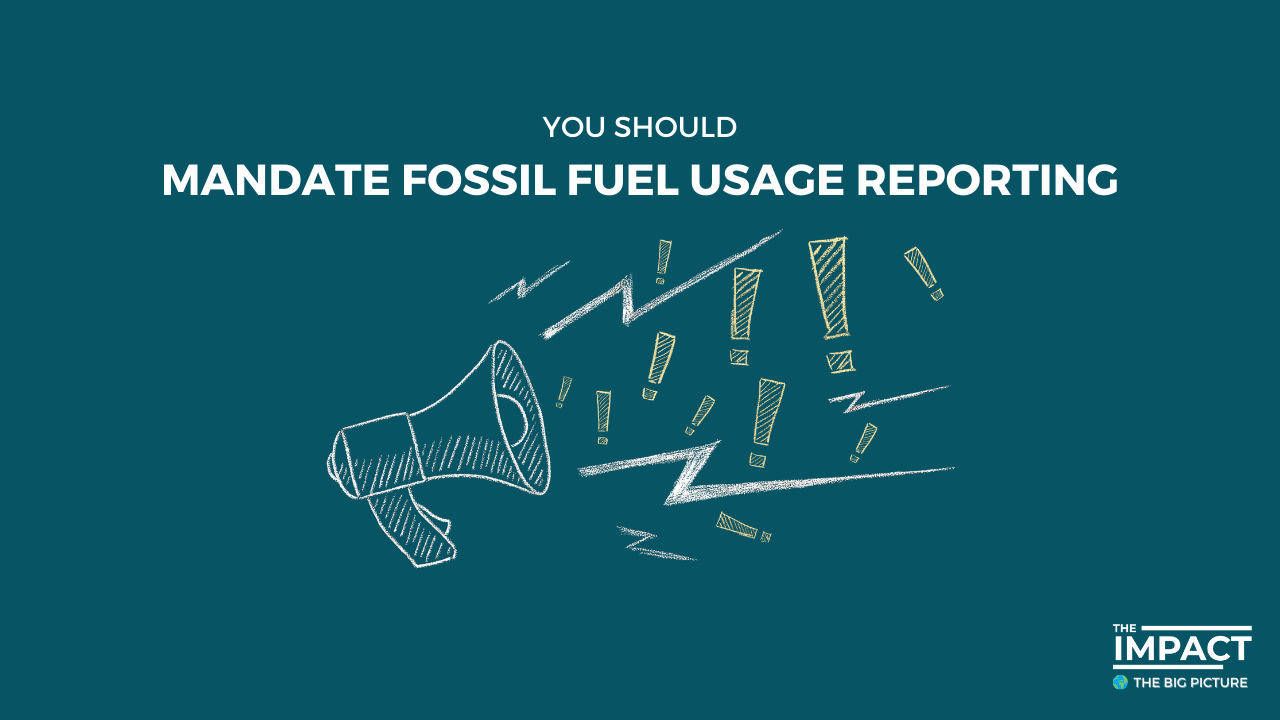The Securities and Exchange Commission recently announced rules that – if enacted – would require disclosure of:
- Climate-related risks to the business
- Direct and indirect emissions from fossil fuel use
These would be hugely important in moving toward quantifying problems and enabling solutions that decarbonize our economy. Demanding good data on fossil fuel usage from the biggest users is what will enable accountability in solving our energy supply problems.
Some of you asked: What can you do? How do you do it? What’s the deadline? We’re here to tell you: a lot and it’s important (and by the 17th of June, but don’t wait).
What you can do
- Write to the SEC yourself by emailing comments to: [email protected]
- Keep it really simple. A few bullet points only.
- Say who you are and why you write.
- Read a few examples of SEC NPRM (Securities and Exchange Commission Notice of Proposed Rule-Making) responses and use them as the basis. (We’ll offer our own soon.)
- Imagine that you have their attention for 20 seconds. No more; say what you have to say and make the reader nod. Or smile.
- Find an environmental policy group and support their submission. Co-sign it. Help them write it. Help it get public attention. Write to the SEC and endorse a well-argued submission.
- Write to your congressional representative and ask them to support this. Present it as aligned with their interests: environmental, for example, or in presiding over well-ordered markets.
- Connect your points to the SEC mission: “to protect investors; maintain fair, orderly, and efficient markets; and facilitate capital formation. The SEC strives to promote a market environment that is worthy of the public’s trust.” Uniform reporting on fossil fuel risk aligns with this mission.
- Refer to analogous rules being adopted elsewhere.
- Write in specific opposition to filings against the rules. (See the end of this piece.)
Why you should write to the SEC
Because the forces that will oppose the SEC rules are bigger, better organized, and have more money. The oil and coal industry. Some right-wing groups that want a kleptocratic economy (meaning: they can syphon off funds for themselves if there are fewer rules). Financial institutions that oppose any rules.
Because we’re right. Not just on this subject, fossil fuels, but on all activities that pose existential risk to humanity. Solving problems created by industry, by governments, and by society requires that problems be acknowledged and quantified. The SEC rules, imperfect though they may be, as proposed or as implemented, are a big step toward both acknowledging that fossil fuel use is a systemic risk to the economy and emphasizing the importance of solutions.
There aren’t many places where our individual voices can make a difference, where we each take a role in moving aside the colossal strength of the fossil fuel giants. This is one such place. This opportunity arises: we must answer.
Writing is a relatively easy way to advocate for change, with potentially important impact. Do it, build the muscle of doing it, and persuade others to do similarly. To understand how you and we can change the narrative, look at the arguments made a year ago on the same subject. Fossil-fuel proponents argued that the rules were outside the SEC’s scope. This shows what we must do: argue carefully, thoughtfully in support of fair rules.
Take the fight to the opposition
To understand how creepily dishonest specific responses to the SEC call can be, take a moment to look at a response posted at The City Journal, a right-wing, New York-based magazine that aims to participate in public policy decisions, nationwide. There, a submission attacks the proposed rules in a piece entitled “Mission Creep at the SEC: The agency’s proposed climate-disclosure requirements overstep its traditional role.” Surely, the worst is yet to come, but already this deploys all manner of Serious Words in disingenuous support of nonsense.
Among its logical fallacies:
- Deflection and trivialization: By comparing climate change – where the collective actions of most humans and organizations are causal – to things out of our control: “thermonuclear conflict, solar flares, or viral pandemics” (paragraph 7, if you’re reading along). Grow up. Climate risks are real and uncontained. We’re to blame. Quantification is important. Just do the work.
- Misleading: It argues (final paragraph) that gathering the data would be an extra cost with inadequate benefit. The truth is big companies whose operations consume lots of fossil fuels care about it a lot, and have staff and consultants gathering data and crunching numbers to lower their cost. Reporting fuel use would take minimal extra costs, and the benefit to investors and to society would be great. (Firms with insignificant impacts would be exempted.)
- Non-sequitur: It argues (again, final paragraph) that having the data made public would hinder the creation of orderly markets. Really? I mean, that’s just nonsense. Having the data public, and uniform, is essential to orderly markets.
The good news about this is: the arguments are so evidently false that they can be debunked. The good news is also this: you can help doing it.
We can and must. That’s why we must write.
About The Author

John is a physicist and business analyst, working on macro-economics of the end of fossil fuel s. His analyses investigate and bild data to understand the transformation of the global economy that will emerge as the global economy moves away from burning oil and coal. Separately he leads a cyber security startup and advises a major European firm on technology strategies. Earlier work includes as a Google [x] senior director, overseeing an unannounced project, working in Taiwan leading a tech startup, and as a Monitor group partner, leading strategy analysis for technology companies – particularly where the strategies needed deep insight into the underlying physical technologies.He has a PhD in physics from Imperial College, London, and with art education from the Royal College of Art. He now lives in a floating home in Sausalito, California, with his wife, noted tech pioneer Dr. Mary Lou Jepsen, as well as a small dog and a collection of paddle boards and kayaks.

